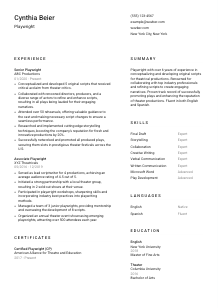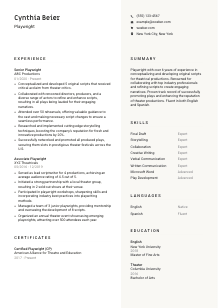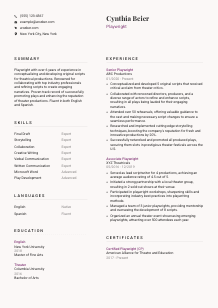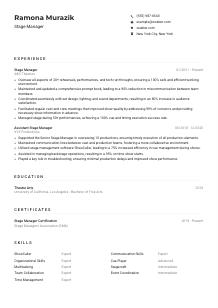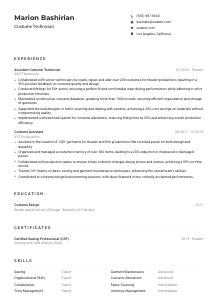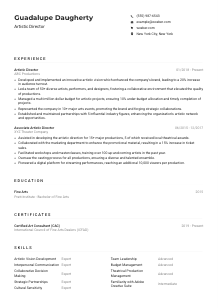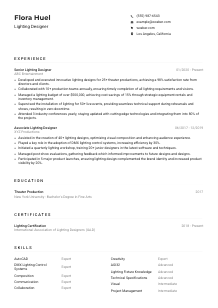Playwright Resume Example
Crafting stories, but your resume feels like a never-ending monologue? Delve into this Playwright resume example, honed with Wozber free resume builder. Discover how you can draft your dramatic journey to align with theater companies seeking your narrative prowess!
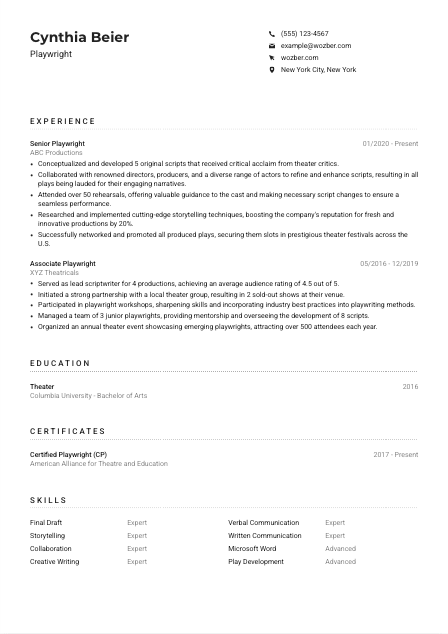
How to write a Playwright Resume?
Greetings, future Shakespeare! If weaving narratives that captivate and mesmerize is your forte, your resume should be no exception. In the theatre of job applications, your resume takes center stage. This guide, powered by Wozber free resume builder, will direct you in harmonizing your storytelling prowess with the exacting standards of today's job market—including ATS compliance. Your script is ready, the audience waits; let's raise the curtain and show them why you're the Playwright they've been waiting for.
Personal Details
Even in the grand drama of job searching, the opening act—the Personal Details section—sets the tone. It's more than just a formality; it's an opening soliloquy that introduces you to the world. Below, we'll explore how to craft this section for a Playwright position, reflecting both your persona and the requisites of your potential employers.
1. Name in Lights
Think of your name as the title of your latest play: it should be clear, unforgettable, and prominently placed. Opt for a font that is legible and consider size to ensure it catches the eye first.
2. Play the Part
Right beneath your name, position yourself for the role you desire by titling yourself as a "Playwright." This immediate alignment with the job title guides the recruiter's understanding and sets expectations.
3. The Communication Channels
Ensure your phone number and email adhere to professionalism; any deviation could break the immersion. The email format of firstname.lastname@email.com is your stage directions for clarity.
4. Stage Location
"Must be located in New York City, New York"—the job calls for a native player. Your address, stating "New York City, New York," is not merely a detail but a compliance with the script's setting.
5. Professional Backdrop
If your career has a portfolio or a LinkedIn profile showcasing your produced plays or scripts, include it. It's the backdrop to your professional persona, enriching the storyline.
Takeaway
Consider your Personal Details as the teaser of your career narrative. It's crafted to intrigue, inform, and invite closer scrutiny, just like the opening scene of your favorite play. Step forward confidently, for this is your introduction to a world ripe with opportunity.





Experience
The core of your Playwright resume lies in the Experience section, where your professional saga unfolds. This act of your resume is pivotal, demonstrating your ability to breathe life into roles and responsibilities with your unique flair. Let's choreograph this section to reflect not just where you've been but the peaks you've scaled.
- Conceptualized and developed 5 original scripts that received critical acclaim from theater critics.
- Collaborated with renowned directors, producers, and a diverse range of actors to refine and enhance scripts, resulting in all plays being lauded for their engaging narratives.
- Attended over 50 rehearsals, offering valuable guidance to the cast and making necessary script changes to ensure a seamless performance.
- Researched and implemented cutting‑edge storytelling techniques, boosting the company's reputation for fresh and innovative productions by 20%.
- Successfully networked and promoted all produced plays, securing them slots in prestigious theater festivals across the U.S.
- Served as lead scriptwriter for 4 productions, achieving an average audience rating of 4.5 out of 5.
- Initiated a strong partnership with a local theater group, resulting in 2 sold‑out shows at their venue.
- Participated in playwright workshops, sharpening skills and incorporating industry best practices into playwriting methods.
- Managed a team of 3 junior playwrights, providing mentorship and overseeing the development of 8 scripts.
- Organized an annual theater event showcasing emerging playwrights, attracting over 500 attendees each year.
1. Spotlight On Requirements
Begin with a script analysis—examine each line of the job requirements. The role demands a Playwright with "Proven experience and a minimum of 3 produced plays." Draw parallels to your own career script.
2. Setting the Scenes
Structure your experience as a series of acts, with the most recent role taking the lead. Each experience should narrate a story—of creation, collaboration, and achievement.
3. Crafting Character Arcs
Detail accomplishments that resonate with the role's demands. Your scripts that received critical acclaim, the seamless integration of innovative storytelling techniques, and your prowess in promoting plays—these are the plot points that define your arc.
4. The Power of Numbers
Quantifying achievements transforms them from abstract to concrete. Much like the clarity a script's word count provides to a producer, numbers offer a tangible measure of your impact.
5. Relevant Acts Only
Edit ruthlessly, leaving only the experiences that speak to your aptitude for the role. Less essential roles are like subplots that, while interesting, can distract from the central narrative.
Takeaway
Your Experience section is the dramatic climax of your resume. It's where you showcase not just what you've done, but how you've ascended the ranks of Playwrights. Align it closely with the requirements, and let each bullet point be a testament to your ability to captivate, innovate, and engage.
Education
In the theatre of your career, your education lays the foundation. Here, we illuminate how the educational section of your Playwright resume can underscore your qualifications, resonating with the melody of mastering the craft.
1. The Script's Demands
First, identify the educational qualifications as per the call. Our spotlight shines on a "Bachelor's degree in English, Theater, or a related field." Ensure your educational chronicles match this.
2. Act Structure
Organize this section with the clarity of a well-structured plot. Degree, field of study, institution, and graduation date—each element has its place and purpose.
3. Role Alignment
"Bachelor of Arts in Theater"—this degree is not merely a prop; it's part of your character development, aligning directly with the Playwright role you're auditioning for.
4. Specialty Scenes
For roles demanding a niche skill set or at the dawn of your journey, listing relevant courses or workshops solidifies your commitment. For seasoned professionals, the broader strokes of your degrees paint the picture.
5. Accolades and Associations
Distinctions or affiliations with theatre clubs and societies can add depth to your character, especially in earlier career stages. They're like critics' reviews—testaments to your dedication and skill.
Takeaway
Your resume's Education section is a testament to your preparation for the role of Playwright. It underscores the theoretical foundation upon which your practical achievements rest. As you list your educational credentials, remember, it's not just about the completion—it's about the journey and what you've garnered along the way.
Certificates
In the world of Playwriting, continual learning and accolades play supporting roles that enhance your main character. Certificates are like awards and nominations—they provide external validation of your expertise and dedication to your craft.
1. Revisiting the Script
Scan the job listing once more. While specific certifications weren't mentioned, showcasing related achievements, like a "Certified Playwright (CP)" from the American Alliance for Theatre and Education, demonstrates commitment and prestige.
2. Selective Showcase
Quality over quantity—highlight certificates that enhance your narrative as a Playwright. Each listed certification should contribute to the plot of you being the ideal candidate for the role.
3. The Date of the Premiere
Dates of acquisition, much like premiere dates, provide a timeline of your growth. They tell a story of lifelong learning and proactive skill enhancement.
4. The Continued Saga
The theatre scene evolves, and with it, so should you. Keep your certifications updated and seek opportunities for continued professional development. Your dedication to mastering your craft is a compelling subplot in your career narrative.
Takeaway
Certificates in your resume's portfolio play the role of accolades—it's not just about the learning, but the recognition of your pursuit of excellence. Highlight them as proof of your ongoing commitment to the art of playwrighting, and as markers of your evolving mastery.
Skills
The Skills section is the prop room of your resume—a neatly organized cache of tools you bring to the production. Crafting this section requires a meticulous selection of hard and soft skills that resonate with the essence of a Playwright.
1. Deciphering the Script
Review the job listing for clues on the most sought-after skills. "Strong storytelling skills" and "Proficiency in relevant software or tools for scriptwriting" are clear calls for specific competencies.
2. The Right Props
List skills that are relevant and directly match the job requirements. Combining both hard skills like "Final Draft proficiency" with soft skills such as "Exceptional written and verbal communication skills" provides a balanced view of your capabilities.
3. Script Organization
Organize your skills to ensure clarity and ease of reading. Prioritize those most relevant to the role of a Playwright at the top, as these are the primary tools you'll wield in your role.
Takeaway
Curate your Skills section with the precision of a director selecting the perfect cast for a play. Each skill you list is a testament to your readiness and suitability for the role. Tailor it to the job, ensuring that your proven prowess in storytelling and scriptwriting shines through as clearly as your initiative and collaborative spirit.
Languages
In the global theatre, the ability to communicate in multiple tongues can be an asset, especially for a Playwright. This section is your chance to display linguistic dexterity, adding layers to your character and appeal.
1. Scanning the Prompt Book
Begin by reviewing the job listing to identify any specifically requested languages. For our Playwright position, versatility in languages wasn't a direct requirement but knowing additional languages, such as Spanish, enhances your narrative.
2. Main Roles
Prioritize languages critical to the role or those mentioned in the job description, showcasing your proficiency levels accurately from "Native" to "Basic".
3. Supporting Roles
Secondary languages also deserve a spot on the stage. They might not be the stars of the show but can play crucial roles in certain scenarios, showcasing your versatility.
4. Authentic Portrayal
Be honest about your proficiency level. Overstating your fluency can lead to awkward situations, akin to an actor forgetting their lines on stage.
5. Understanding the Audience
For roles that might benefit from multilingual prowess—like those involving international collaboration or translation—highlighting language skills could move you from understudy to lead.
Takeaway
Your linguistic abilities adorn your resume like a well-placed stage prop—they enhance the overall presentation and demonstrate versatility. They signal to prospective employers your ability to navigate diverse cultural narratives, opening up possibilities for richer, more engaging storytelling.
Summary
Your resume Summary is the captivating monologue that begins your performance, inviting the audience to lean in and listen. It's your chance to summarize your professional journey, weaving a narrative that aligns your past roles, skills, and accomplishments with the Playwright role at hand.
1. Understanding the Plot
First, digest the essence of the job description. It's your source material for crafting a summary that's both compelling and relevant, touching on key requirements such as "Strong storytelling skills" and "Proven experience as a Playwright."
2. Setting the Scene
Begin your summary with an assertive opening line that positions you squarely in the Playwright role. Highlight your years of experience and major accomplishments in the field.
3. Developing the Character
Mention your core skills and notable achievements next. Reference specific examples, such as the number of original scripts you've developed or the success of your plays in festivals.
4. The Final Act
Conclude with a powerful closing statement that encapsulates your essence as a Playwright. Let it be a call to action that beckons the reader to delve deeper into the acts that follow—your experiences, education, and skills.
Takeaway
Your resume Summary is where you paint the broad strokes of your professional self-portrait. It's your chance to captivate from the outset, setting the tone for the narrative that unfolds in the details of your resume. Keep it concise, impactful, and reflective of your unique value as a Playwright.
Curtain Call
Congratulations, you've reached the end of this act in your journey to crafting a Playwright resume that not only meets the standards of today's job market but stands out in the flood of applications. Through deliberate structuring, mindful tailoring, and the strategic spotlighting of your unique skills and experiences, your resume is now a testament to your prowess and readiness for the Playwright role you aspire to. Remember, the ATS-compliant resume format and keywords optimization using Wozber's free resume builder and ATS resume scanner are the directorial touches that ensure your resume is not only read but also remembered.
Step into the spotlight with confidence; your next big role awaits.

- Bachelor's degree in English, Theater, or a related field.
- Proven experience as a Playwright with a minimum of 3 produced plays or scripts.
- Strong storytelling skills and the ability to create characters with depth.
- Exceptional written and verbal communication skills.
- Proficiency in relevant software or tools for scriptwriting.
- Must be located in New York City, New York.
- Conceptualize and develop original scripts for theatrical productions.
- Collaborate closely with directors, producers, and actors to refine and revise scripts.
- Attend rehearsals, offering guidance and making necessary script changes.
- Research and stay updated on current theatrical trends to ensure fresh and innovative storytelling.
- Network and promote produced plays to theaters, festivals, and other relevant organizations.





